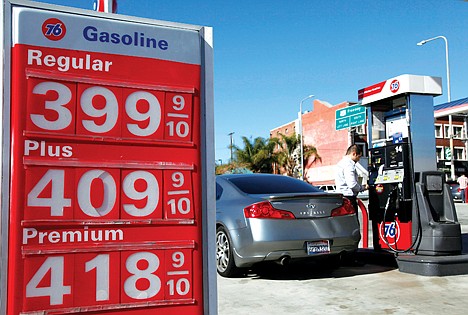Heading in the wrong direction
NEW YORK - Gasoline prices are getting an early start on their annual spring march higher.
The average U.S. retail price rose 13 cents over the past two weeks to $3.42 per gallon, and within a few days it will likely set a record for this time of year.
The culprits: Rising crude oil prices, slowing output at refineries that are undergoing maintenance, and low supplies of gasoline.
These are the kinds of things that push gasoline prices higher every spring after what is normally a lull in gasoline prices in the late fall and early winter. But a heavy schedule of January maintenance at West Coast refineries has led to sharply higher prices there. Meanwhile, low inventories have pushed prices higher on the East Coast.
And rising crude oil prices have pushed prices higher throughout the country.
"I'm not surprised at what I'm seeing, but I am surprised it's coming early," said Tom Kloza, Chief Oil Analyst at the Oil Price Information Service.
Hopes of stronger economic growth in the U.S. and abroad helped push the U.S. stock market to a five-year high in January and sent crude prices up. When economies expand, more gasoline, diesel and jet fuel are consumed by shippers and travelers.
Crude oil has risen 14 percent since mid-December, to $97.49 on Thursday. Brent crude, the benchmark used to price oil that most U.S. refineries use to make gasoline, is up 9 percent since then to $115.55
But gasoline wholesale prices are rising even faster. That's the price distributors and service stations pay to buy the gasoline that they then sell to drivers. Wholesale prices in California are up 56 cents - a 20 percent jump - to $3.32 per gallon, in just two weeks, according to Kloza. Many California drivers will soon see $4 a gallon at local stations. Smaller but still substantial jumps are being seen throughout the country.
Retail gasoline prices have risen for 14 days straight, according to AAA. The average price for the month of January was $3.32, the second highest January average ever, although a nickel cheaper than last year's record. In each of the last two years gasoline prices rose sharply at the beginning of the year because tensions in the Middle East raised fears that oil supplies would be disrupted. In 2011 it was the Libyan uprising; in 2012 it was Iran's threat to close a key shipping lane.
So far in 2013, gas has been cheaper than it was last year. But that could change by this weekend as stations pass along the cost of their higher priced gasoline to drivers.
The national average price has risen in nine of the last 10 Februarys. Last year gasoline prices jumped 28 cents, or 8 percent, in February and averaged $3.55 for the month.
Analysts still don't expect prices to follow last year's steep path through March that brought them to a high of $3.94 on April 6. Crude oil supplies are high, oil production is booming and the economy isn't growing very fast. Also, the tensions in the Middle East seem to have eased somewhat.
And consider this as you fill up on your way to a Super Bowl party this weekend: The oil and gas analyst Stephen Schork notes that while gasoline prices may seem high, they haven't risen nearly as fast as tickets to the big game. When the first Super Bowl was played 46 years ago, gasoline cost about 32 cents per gallon and Super Bowl tickets cost $10. Now gasoline is $3.42 and a seat in a distant corner of the Superdome costs $2,236 on the ticket-reselling site StubHub.
Put another way, a ticket to the Super Bowl in 1966 was worth about 31 gallons of gasoline then, enough for 2 fill-ups. A ticket to Sunday's game between the Baltimore Ravens and San Francisco 49ers in New Orleans is worth 650 gallons - enough to fill a mid-size sedan 43 times.
Which makes gasoline, according to Schork, "a bargain.

